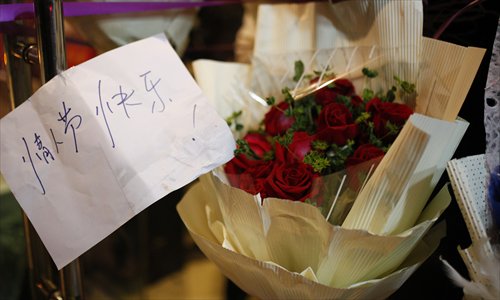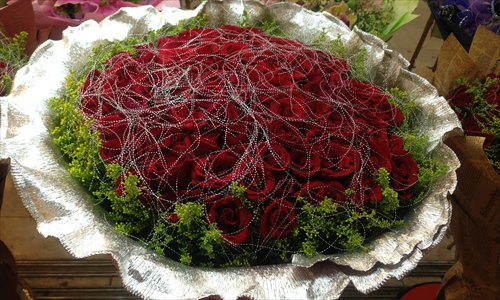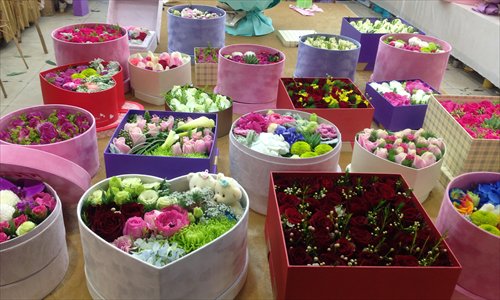Love gets expensive

Last Friday was special - it was the day to mark the traditional Chinese Lantern Festival and the Western day for lovers, Valentine's Day. The days coincide once every 19 years and this year Shanghai's lovers and would-be lovers set out to celebrate in style.
Daniel Wang, a Shanghai office worker, was one of the thousands of young men planning to court a girlfriend with a romantic and memorable Friday night out. He had already booked a sumptuous five-course dinner at a posh five-star hotel and the only errand left for Wang was to buy a bouquet of roses before he picked up his girlfriend.
As usual, Wang went to a popular flower shop near his office on Shaanxi Road South in downtown Jing'an district. To his surprise, the owner of the shop where he had ordered flowers for the last three years this year charged Wang 500 yuan ($82.45) for an exquisitely wrapped bouquet of red roses.
"The price shocked me - I used to only pay between 200 yuan and 300 yuan for bunches of roses like this at this same shop - even on Valentine's Day. However, the price of the roses that I bought this year had more than doubled over the price for the flowers last year. And those roses cost nearly half the price of the dinner," the 28-year-old Shanghai man complained to the Global Times at the weekend.

An unusual hike
Although it is customary for florists to charge more for flowers on and before Valentine's Day, this year's hike in rose prices was unusual. Some florists in Shanghai did warn customers that the supply of flowers in the city - not just roses but lilies, tulips and carnations as well - had been drastically affected by an exceptionally cold winter in Kunming, the capital of Yunnan Province in Southwest China. Kunming is called the Spring City and is the country's major source of flowers.
However because of constant snow since December, Kunming has reported a serious decline in flower production. The city's rose production output was cut by two-thirds with most plants killed off by the cold, the Shanghai Morning Post reported, adding that the wholesale price of single roses had climbed to around 6 yuan in Kunming, the highest price ever recorded in the city. Thus Kunming's record prices arrived at Shanghai florists last week.
The owner of the Rainbow Flowers Shop on Weihai Road told the Global Times that a couple of days before Valentine's Day she had raised the retail price of a single rose to 20 yuan, a 30 percent increase on the normal price for a rose this year.
"Yes, it's true that the price of flowers this winter is a lot higher than for the past few winters, largely because of the heavy snow in Yunnan. For the past two winters I was charging 5 to 7 yuan for a single rose, but this winter I had to set the price at between 12 and 15 yuan depending on availability and operating costs," she said.
Her words were echoed by florists at the Shanghai Caojiadu Flower Market, the city's largest flower wholesale market on Wanhangduhou Road, Jing'an district. Of nearly a dozen flower shop owners that the Global Times interviewed on Valentine's Day, most of them confirmed this year's unusual hike in flower prices, with the burgeoning price of roses being the most recent and noticeable.

No choice
"The wholesale price of roses for us city florists has doubled or even tripled compared to the same period last year. We had no choice but to raise our prices to make ends meet," the owner of the Shu Yi Flower Shop in the market told the Global Times.
At his shop, a classic bunch of 11 red roses cost 300 yuan. "Despite the higher prices, we aren't making a fortune - the soaring prices have made many potential customers hesitate and business has suffered," the owner, a man surnamed Hu, complained.
These sentiments were repeated by another flower seller surnamed Yao who has run a shop called Xiayu Huafang in the market for several years. "I used to import roses from Yunnan at a very reasonable price, say 2 yuan for a single bloom. But this year, I had to pay twice or even three times the price that I have paid for the last couple of years. That's why we had to raise the prices to survive," Yao said.
At the entrance to Yao's shop there was a huge bouquet of 99 roses on sale for 2,800 yuan. He admitted that the spectacular bunch was mainly designed to attract attention.
"Customers have become more budget-minded these days. Few people would buy an expensive bunch like this, especially with this year's unusual hike in prices. Most people choose other flowers like lilies and carnations to match the roses or they just give gifts other than flowers to their loved ones," Yao said.
One 30-something customer, surnamed Zhang, told the Global Times that he had stayed in the market after lunch to check out the shops to get a real bargain. After looking round the market for a couple hours, Zhang sealed his deal with a bunch of pink roses which cost him 200 yuan.
Other ways
"This is the best I could manage at the market this year. Although I traditionally give my wife flowers on Valentine's Day and on our wedding anniversary, I don't see the need to spend a fortune on flowers at a period when the prices have risen so dramatically. There are other ways that I can show my love and affection to my wife."
While almost all the florists in the market were feeling the pinch and have seen business slump this year, they seemed optimistic about the future. "There's always a need for a market where people can buy flowers for different occasions and reasons. All we have to do is to adjust our business strategy in terms of pricing, marketing and service," another shop owner told the Global Times.
According to a Shanghai Hongqiao Flower Market manager who wanted to remain anonymous most Shanghai florists set their prices based on purchasing and operating costs.